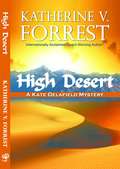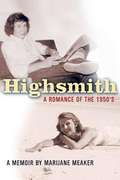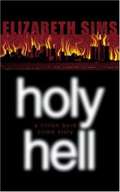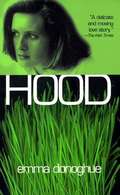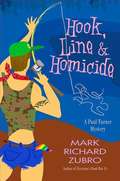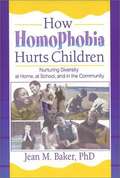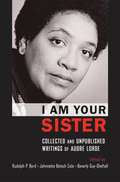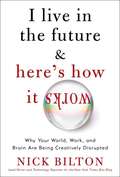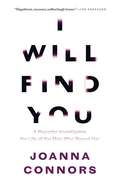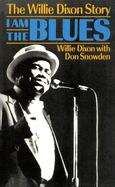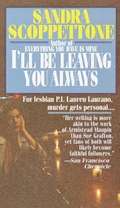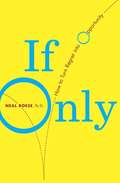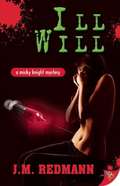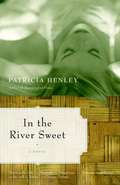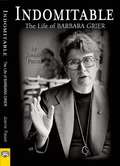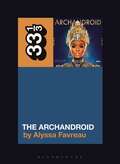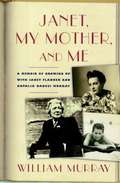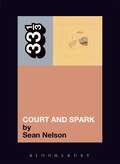- Table View
- List View
High Desert (Kate Delafield Mysteries #9)
by Katherine V. ForrestIn this long-awaited new installment of the legendary Kate Delafield mystery series, Kate is forced to confront her most formidable opponent: herself. Five months into mandated retirement from LAPD, her long term on-again off-again relationship with Aimee Grant off again, hopelessly dependent on the only substance that can drown her pain over Aimee and the illness of her best friend, lost without her police career, beset by terrifying dreams, Kate Delafield is in a world of trouble. Into this world walks Captain Carolina Walcott of the LAPD, with a request that Kate quietly and secretly try to locate Kate's former police partner, Joe Cameron, who has vanished. She also offers Kate a business card#151;the name on it a woman from Kate's past who may be able offer a lifeline back to the self Kate once was. Even as she deals with a shocking and inexplicable homicide, Kate simultaneously pursues a trail of evidence toward Cameron that leads her into the high desert. Here in the high desert she will find challenges to the truth of everything she ever believed in as a principled police officer. Here in the high desert she must decide what it is she still believes: about her past, her present, her future.
Highsmith: A Romance of the 1950s
by Marijane MeakerPatricia Highsmith, author of such classics as The Talented Mr. Ripley and Strangers on a Train, was a writer who defied simple categorization. Gore Vidal called her: "One of the greatest modernist writers." The Cleveland Plain Dealer rightly commented: "Patricia Highsmith is often called a mystery or crime writer, which is a bit like calling Picasso a draftsman." To young novelist Marijane Meaker, however, Highsmith was more than a role model. Shortly after the two met in a New York City lesbian bar, they became lovers and embarked on a two year romance amidst the bohemian set of Greenwich Village and the literary crowd of Fire Island. There, the pair navigated the underground lesbian scene, lunched with literary stars like Janet Flanner, shared intimacies, and gossiped with abandon. Written with wit and brassy candor, Highsmith: A Romance of 1950s is a revealing look at the controversial icon of popular American fiction.
Holy Hell (Lillian Byrd Crime Story #1)
by Elizabeth SimsLillian Byrd is a small-time reporter with a flair for making big-time mistakes--so her investigation into the disappearances of women around the Detroit area might not be the best idea. But when one of the victims turns up dead and Lillian recognizes the curiously mutilated corpse, she is in too deep to get out. After simultaneously blowing the case for the police and revealing herself to the killers, she is completely on her own. Can she catch the murderers before they catch up with her? Elizabeth Sims is a 10-year veteran of bookselling. She was a winner of the 1986 Writer's Digest short fiction contest. A longtime resident of the Detroit area, where Holy Hell is set, Sims now lives in Northern California.
Home Buying for Dummies (2nd edition)
by Ray B. Browne Eric TysonEasy-to-follow information on buying a home.
Hood
by Emma DonoghueIn the late '70's Irish convent school teenager Pen O'Grady fell in love with fellow student Cara Wall. Pen, an appealing heroine who is feisty yet vulnerable, and Cara, a free spirit who follows no path but her own, prove themselves to be up to the challenge of a love deemed unacceptable in Catholic Ireland. Their tumultuous relationship, full of love and passion and desire and flight, survives infidelities of all sorts--until they reach their late 20s, when Cara dies in a car accident. Through the elegant use of flashbacks intermingled with the harsh present-day reality of Cara's upcoming funeral, Pen reveals a sexy, beautifully written love story filled with the bittersweet reflections and emotional complexity of an intimate relationship. Above all, it is a graceful tale about coming to terms with loss.
Hook, Line, and Homicide (Paul Turner Mysteries #9)
by Mark Richard ZubroSince when are vacations ever relaxing? All Chicago police Detective Paul Turner is hoping for on his annual retreat from the city and his job is a little peace and quiet. This time he's headed to the Canadian Great North Woods for a couple of weeks with family and friends -- his two teenaged sons, his lover Ben, neighborhood pals, and his long-term police partner, Detective Buck Fenwick, along with his wife. But hopes of tranquility are soon crushed when Turner intervenes in a scuffle between a group of First Nations teens and a local bully and his cohorts. In the days following the incident, Turner and company find themselves the object of a series of attacks, break-ins, and sabotage of their equipment. Unable to get the attention of the local police, the events continue to escalate, culminating in the local bully's dead body being found floating in the water near the dock of their houseboat. Making this not only one of the least relaxing vacations ever, but one of the deadliest.
How Homophobia Hurts Children: Nuturing Diversity at Home, at School, and in the Community (Haworth Gay & Lesbian Studies)
by Jean M. BakerHomophobia hurts kids. Explore ways to minimize that trauma!<P> This book illustrates the ways that children growing up to be gay are harmed by homophobia before anyone, including themselves, even knows they are gay. This compelling and sympathetic volume describes many simple ways that these children can be helped to understand that they can grow up to lead normal lives, with hopes and dreams for their futures. How Homophobia Hurts Children: Nurturing Diversity at Home, at School, and in the Community brings home the voices of these children. They describe their experiences to show how they came to the frightening recognition that they are part of a group held in disregard by the rest of society, even sometimes by their own families.<P> Dr. Jean M. Baker, the author of How Homophobia Hurts Children: Nurturing Diversity at Home, at School, and in the Community is a clinical psychologist and the mother of two gay sons. In this book she shares her experience as both psychologist and mother to show how the myths and fallacies about homosexuality have influenced parents, schools, churches, and lawmakers to send children the cruel message that if they are gay, they are not normal and will not be able to lead normal lives. <P> In this unique volume you'll find:<P> * a chapter on identity development, following the Eriksonian model<P> * interviews with high school students who are self-identified as gay<P> * firsthand descriptions of the harassment and victimization of those perceived as gay in schools<P> * research on how victimization at school affects gay youths<P> * a discussion of the relatively new phenomenon of gay/straight alliances (gay support groups or clubs)<P> * a chapter on transgender identity with interviews with four transsexual persons who describe their personal childhood experiences and their transition process<P> The focus of How Homophobia Hurts Children: Nurturing Diversity at Home, at School, and in the Community, centering on the social and familial experiences of children who will grow up to be gay but have not yet come to that realization, is unique. But beyond that, this book also explains how homophobia affects the attitudes of non-gay children by leading them to believe that it is acceptable to mistreat homosexuals. Finally, specific suggestions are made for changes in parenting and changes in school/classroom practices that could help prevent the harm that is inflicted upon so many of our gay children. Everyone who comes in contact with children on their way to becoming gay/lesbian/bisexual/transgender adults needs to read this book!
How Sex Changed: A History of Transsexuality in the United States
by Joanne MeyerowitzHow Sex Changed is a fascinating social, cultural, and medical history of transsexuality in the United States. Joanne Meyerowitz tells a powerful human story about people who had a deep and unshakable desire to transform their bodily sex. In the last century when many challenged the social categories and hierarchies of race, class, and gender, transsexuals questioned biological sex itself, the category that seemed most fundamental and fixed of all. From early twentieth-century sex experiments in Europe, to the saga of Christine Jorgensen, whose sex-change surgery made headlines in 1952, to today's growing transgender movement, Meyerowitz gives us the first serious history of transsexuality. She focuses on the stories of transsexual men and women themselves, as well as a large supporting cast of doctors, scientists, journalists, lawyers, judges, feminists, and gay liberationists, as they debated the big questions of medical ethics, nature versus nurture, self and society, and the scope of human rights. In this story of transsexuality, Meyerowitz shows how new definitions of sex circulated in popular culture, science, medicine, and the law, and she elucidates the tidal shifts in our social, moral, and medical beliefs over the twentieth century, away from sex as an evident biological certainty and toward an understanding of sex as something malleable and complex. How Sex Changed is an intimate history that illuminates the very changes that shape our understanding of sex, gender, and sexuality today.
I Am Your Sister: Collected and Unpublished Writings of Audre Lorde
by Rudolph P. Byrd Johnnetta Betsch Cole Beverly Guy-SheftallAudre Lorde was not only a famous poet; she was also one of the most important radical black feminists of the past century. Her writings and speeches grappled with an impressive broad list of topics, including sexuality, race, gender, class, disease, the arts, parenting, and resistance, and they have served as a transformative and important foundation for theorists and activists in considering questions of power and social justice. Lorde embraced difference, and at each turn she emphasized the importance of using it to build shared strength among marginalized communities. I Am Your Sister is a collection of Lorde's non-fiction prose, written between 1976 and 1990, and it introduces new perspectives on the depth and range of Lorde's intellectual interests and her commitments to progressive social change. Presented here, for the first time in print, is a major body of Lorde's speeches and essays, along with the complete text of A Burst of Light and Lorde's landmark prose works Sister Outsider and The Cancer Journals. Together, these writings reveal Lorde's commitment to a radical course of thought and action, situating her works within the women's, gay and lesbian, and African American Civil Rights movements. They also place her within a continuum of black feminists, from Sojourner Truth, to Anna Julia Cooper, Amy Jacques Garvey, Lorraine Hansberry, and Patricia Hill Collins. I Am Your Sister concludes with personal reflections from Alice Walker, Gloria Joseph, Johnnetta Betsch Cole, Beverly Guy-Sheftall, and bell hooks on Lorde's political and social commitments and the indelibility of her writings for all who are committed to a more equitable society.
I Live in the Future and Here's How It Works: How New Media Is Creatively Disrupting Your World, Work, and Brain
by Nick BiltonExploring how the Internet is creating a new type of consumer, Bilton's book captures the zeitgeist of an emerging age, providing the understanding of how a radically changed media world is influencing human behavior.
I Will Find You
by Joanna Connors"This is it. My rape. I knew it was coming. Every woman knows. And now here it is. My turn. " When Joanna Connors was thirty years old on assignment for the Cleveland Plain Dealer to review a play at a college theater, she was held at knife point and raped by a stranger who had grown up five miles away from her. Once her assailant was caught and sentenced, Joanna never spoke of the trauma again, until 21 years later when her daughter was about to go to college. She resolved then to tell her children about her own rape so they could learn and protect themselves, and she began to realize that the man who assaulted her was one of the formative people in her life. Setting out to uncover the story of her attacker, Connors embarked on a journey to find out who he was, where he came from, who his friends were and what his life was like. What she discovers stretches beyond one violent man's story and back into her own, interweaving a narrative about strength and survival with one about rape culture and violence in America. I Will Find You is a brave, timely consideration of race, class, education and the families that shape who we become, by a reporter and a survivor.
I am the Blues: The Willie Dixon Story
by Willie DixonI Am The Blues captures Willie Dixon's inimitable voice and character as he tells his life story: the segregation of Vicksburg, Mississippi, where Dixon grew up, the prison farm from which he escaped and then hoboed his way north as a teenager, his equal-rights-based draft refusal in 1942, his work--as songwriter, bassist, producer, and arranger--with Muddy Waters, Howlin' Wolf, Little Walter, Bo Diddley, and Chuck Berry which shaped the definitive Chicago blues sound of Chess Records: and his legal battles to recapture the rites to his historic catalog of songs. Don Snowden has supplemented Dixon's reflections with interviews with other performers and Chess insiders. In the Appendixes, Snowden gives a comprehensive discography and a list of the major artists who have recorded Dixon's songs.
If Only: How to Turn Regret into Opportunity
by Neal J. RoeseIf you spend a lot of time thinking about "what might have been," you're not alone. In If Only, Neal Roese, Ph.D., one of the world's top scientists studying regret, shows us that thoughts about what might have been are practically unavoidable. In fact, they are produced spontaneously by the brain with a very practical goal--to guide us toward improvement. But the same thoughts can bring the pain of regret. Is it worth the pain to get the improvement? Or should you live life with no regrets? Luckily, it's not a package deal. The surprising message of If Only is that we can manage our regret style to maximize the gain and minimize the pain. In an entertaining and upbeat book that weds lively science writing to practical self-help, Dr. Roese mines the research and shares simple strategies for managing your life to make the most of regret. You'll learn: *Don't Over-react.You may react to a regrettable situation by taking many fewer chances. Don't. This only ensures that you will miss out on new opportunities. *Think Downward. Consider the downward alternatives. How could a bad situation have gone even worse? This makes you feel appreciative of what you have. *Do It. If you decide to do something and it turns out badly, research shows that it probably won't haunt you down the road. (You'll reframe the failure and move on.) But you will regret the things left undone. *Regrets are Opportunities Knocking. Our brains produce the most "if only" thoughts about things in our lives that we can still change. So consider regret as a signal flashing: It's not too late! If Only also shows that "if only" thinking plays a huge role across our lives, from how best to buy, to why we enjoy movies, how juries decide, and the way we choose someone to love. If Only opens a new window into the way our minds work and offers clear lessons for living more happily with the past. "Fifteen years of research have been combined into a list of the top four biggest regrets of the average American: * not getting more education * career regrets * regrets in love * not spending enough time with kids The list is essentially a summary of the biggest traps, pitfalls, and mistakes into which people like you might blunder. Look over the list and try to identify areas of your life that represent the greatest vulnerability to future regret. And act now to avoid regret later." --from If Only.
Ill Will (Micky Knight Mystery #7)
by J. M. RedmannFirst, do no harm. But as New Orleans PI Micky Knight discovers, not every health care provider follows that dictum. She stumbles into a tangle of the true believers to the criminally callous, who use the suffering of others for their twisted ends. In a city slowly rebuilding after Katrina, one of the most devastated areas is health care, and the gaps in service are wide enough for the snake oil salesmen--and the snakes themselves--to crawl through. First, her investigation is driven by anger, but then it becomes personal as someone very close to Micky uses her cancer diagnosis to go where Micky cannot, into the heart of the evil where only the ill are allowed. Micky is her only lifeline out. Can Micky save her in time to get to the medical treatment she desperately needs to survive? This is the seventh Micky Knight mystery.
In The River Sweet
by Patricia HenleyNational Book Award finalist Patricia Henley captivates us with this engrossing novel of a woman whose long-held secret will transform her life and her marriage. From all appearances, Ruth Anne Bond is enviably lucky. Her husband, Johnny, still treats her like a young lover. Her grown daughter is a staunch friend. Her steady work and devotion to the church have quietly made her a pillar of the community. Then one long Indiana summer brings some unexpected communiqués—including one she has both craved and feared for thirty years. As long-hidden truths threaten to emerge, for the first time in her marriage Ruth Anne is faced with memories she and Johnny never discuss: of a year spent in Saigon in 1968—and a past she has yet to acknowledge. Probing questions of family and faith, Patricia Henley offers us a tender, far-sighted novel about seeking answers and achieving grace.
Indomitable: The Life of Barbara Grier
by Joanne Passet"Whatever else will be said about her--and you can bet there will be plenty, because Barbara was no stranger to controversy--the one thing that is true above all else is that she was the most important person in lesbian publishing in the world. Without her boldness and her audacity, there might not be the robust lesbian publishing industry there is today. ” --Teresa DeCrescenzo Barbara Grier--feminist, activist, publisher, and archivist--was many things to different people. Perhaps most well known as one of the founders of Naiad Press, Barbara’s unapologetic drive to make sure that lesbians everywhere had access to books with stories that reflected their lives in positive ways was legendary. Barbara changed the lives of thousands of women in her lifetime. For the first time, historian Joanne Passet uncovers the controversial and often polarizing life of this firebrand editor and publisher with new and never before published letters, interviews, and other personal material from Grier’s own papers. Passet takes readers behind the scenes of The Ladder, offering a rare window onto the isolated and bereft lives lesbians experienced before the feminist movement and during the earliest days of gay political organizing. Through extensive letters between Grier and her friend novelist Jane Rule, Passet offers a virtual diary of this dramatic and repressive era. Passet also looks at Grier’s infamous "theft” of The Ladder’s mailing list, which in turn allowed her to launch and promote Naiad Press, the groundbreaking women’s publishing company she founded with partner Donna McBride in 1973. Naiad went on to become one of the leaders in gay and lesbian book publishing and for years helped sustain lesbian and feminist bookstores--and readers--across the country. JOANNE PASSET is Professor of History Emerita at Indiana University East. Her previous books include Sex Variant Woman: The Life of Jeannette Howard Foster, Sex Radicals and the Quest for Women's Equality, Cultural Crusaders: Women Librarians in the American West, and Aspirations and Mentoring in an Academic Environment (with Mary Niles Maack).
It Must be Love 'Cause I Feel So Dumb
by Arthur BarronErik is a New York kid... everything in the city belongs to him - except maybe pretty Lisa Dwyer. Erik is nearly fourteen. He's a loner, but he's not exactly alone. There's his best friend--actually his dog, Bill ... Hubert's Flea Museum on 42nd street ... his comic book collection ... his passion for graffiti. (On the wall in Riverside Park at 98th street is his magnum opus--"ERIK-'75," spray-painted six-feet high.) Still, something has disturbed Erik's equilibrium. Her name is Lisa Dwyer. She's the prettiest pom-pom girl at school. And he thinks he loves her. How can he get her to notice him? He thinks he has just the thing!
Janelle Monáe's The Archandroid (33 1/3 #159)
by Alyssa FavreauIn Janelle Monáe's full-length debut, the science fiction concept album The ArchAndroid, the android Cindi Mayweather is on the run from the authorities for the crime of loving a human. Living in 28th century Metropolis, Cindi fights for survival, soon realizing that she is in fact the prophesied ArchAndroid, a robot messiah meant to liberate the masses and lead them toward a wonderland where all can be free. Taking into account the literary merit of Monáe's astounding multimedia body of work, the political relevance of the science fictional themes and aesthetics she explores, and her role as an Atlanta-based pop cultural juggernaut, this book explores the lavish world building of Cindi's story, and the many literary, cinematic, and musical influences brought together to create it. Throughout, a history of Monáe's move to Atlanta, her signing with Bad Boy Records, and the trials of developing a full-length concept album in an industry devoted to the production of marketable singles can be found, charting the artist's own rise to power. The stories of Monáe and of Cindi are inextricably entwined, each making the other more compelling, fantastical, and deeply felt.
Janet, My Mother, and Me: A Memoir of Growing Up With Janet Flanner and Natalia Danesi Murray
by Williamson MurrayJanet, My Mother, and Me is a charming, captivating memoir about a boy growing up in a household of two extraordinary women. William Murray was devoted to his mother, Natalia Danesi Murray, and to his mother's longtime lover, writer Janet Flanner. Even as a teenager, he accepted their unconventional relationship. His portrait of the two most important people in his life is unforgettable. Janet Flanner was already celebrated as the author of a new style of personal journalism for her "Letter from Paris" in The New Yorker when she met the Italian-born Natalia Murray on Fire Island, New York, in 1940. Their encounter, writes William Murray, was a "coup de foudre, a thunderbolt that instantly sent them rushing into each other's arms and forever altered their lives, as well as mine." Murray was already growing up in two cultures on different continents, in New York and Rome, when his mother's life changed so dramatically. He quickly accepted Flanner and the unusual household in which he found himself. (Natalia's mother, Mammina Ester, also lived with them in New York.) His memories of the women and of his own boyhood and adolescence are touching and often hilarious. Janet, My Mother, and Me offers a look at the world in which gay professional women moved in the decades before such relationships became more open and accepted. Murray's mother was a publishing executive and a broadcaster, and Murray, who originally hoped to become an opera singer and trained for that profession, eventually moved into the professions of both his mother and Flanner, becoming a novelist and then for many years an editor and writer at The New Yorker. This is an exuberant, warm, and often poignant memoir with a memorable cast of characters. Beguiling and unusual, it will remain vivid in readers' minds for years to come.
Joni Mitchell's Court and Spark (33 1/3 Ser. #40)
by Sean NelsonIt’s a sucker bet to try and argue that Blue, or For 2 the Roses, or The Hissing of Summer Lawns are better or worse albums than Court and Spark, or than one another. In a certain way, they all feel like one sustained burst of musical endeavor from an artist who had only just begun to understand what she was capable of—and before she had decided to leave that strength behind in search of new powers. Still, Court and Spark is such a clear turning point, not just in terms of its popularity, but in terms of its approach. It represents a perfect example of an artist reaching out to a wide audience without pandering to it, in what feels, more than three decades on, like an honest attempt to say as much as possible to as many people as possible.
